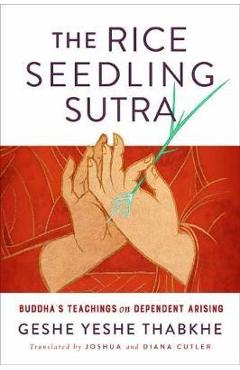Rice Seedling Sutra - Yeshe Geshe Thabkhe

Detalii Rice Seedling Sutra - Yeshe
Vânzător
libris.ro
Pret
97.86 Lei
97.86 Lei
108.73 Lei
Categorie (vânzător)
Philosophy
Marca
Yeshe Thabkhe
Descriere YEO:
Descriere magazin:
One of Tibet\'s great scholars presents the Buddha\'s profound teachings on the laws of karma and dependent arising. In the Rice Seedling Sutra , the Buddha unpacks the law of cause and effect. He notes how in the natural world, a seed becomes a sprout, which produces a flower, which bears fruit. A seed has no intention to sprout; when the right conditions are assembled the fruit arises. Similarly, when our senses encounter an object, a sense consciousness arises naturally, without our intending it. This, says the Buddha, is also how karma works and how actions performed out of ignorance create suffering, whether we want it or not. And this same law of causality also governs enlightenment--when the right conditions are assembled, awakening is assured. In many sutras like this one, the Buddha explains that to understand his Dharma is to understand dependent arising. Geshe Yeshe Thabkhe explores dependent arising, and the corollary teaching of emptiness, through this sutra and others. Commenting on the works of Indian masters such as Shantaraksita, he shows how belief in a creator god is incompatible with dependent arising, and by illuminating the teachings of Nagarjuna and Chandrakirti, he shows how we do--and do not--exist. Geshe Yeshe Thabkhe was among the last generation of scholars to be trained in Tibet before the Chinese occupation. He has been teaching Westerners for decades, having worked with top scholars in the United States, and he is especially familiar with this sutra, having translated the commentary by Kamalasila into Hindi. Here his deep familiarity, combined with his extensive command of the Buddhist scriptures, allows him to present the Buddha\'s words in a rich and authoritative context.

Rice Seedling Sutra - Yeshe - Disponibil la libris.ro
Pe YEO găsești Rice Seedling Sutra - Yeshe de la Yeshe Thabkhe, în categoria Philosophy.
Indiferent de nevoile tale, Rice Seedling Sutra - Yeshe Geshe Thabkhe din categoria Philosophy îți poate aduce un echilibru perfect între calitate și preț, cu avantaje practice și moderne.
Preț: 97.86 Lei
Caracteristicile produsului Rice Seedling Sutra - Yeshe
- Brand: Yeshe Thabkhe
- Categoria: Philosophy
- Magazin: libris.ro
- Ultima actualizare: 08-04-2025 01:30:25
Comandă Rice Seedling Sutra - Yeshe Online, Simplu și Rapid
Prin intermediul platformei YEO, poți comanda Rice Seedling Sutra - Yeshe de la libris.ro rapid și în siguranță. Bucură-te de o experiență de cumpărături online optimizată și descoperă cele mai bune oferte actualizate constant.
Descriere magazin:
One of Tibet\'s great scholars presents the Buddha\'s profound teachings on the laws of karma and dependent arising. In the Rice Seedling Sutra , the Buddha unpacks the law of cause and effect. He notes how in the natural world, a seed becomes a sprout, which produces a flower, which bears fruit. A seed has no intention to sprout; when the right conditions are assembled the fruit arises. Similarly, when our senses encounter an object, a sense consciousness arises naturally, without our intending it. This, says the Buddha, is also how karma works and how actions performed out of ignorance create suffering, whether we want it or not. And this same law of causality also governs enlightenment--when the right conditions are assembled, awakening is assured. In many sutras like this one, the Buddha explains that to understand his Dharma is to understand dependent arising. Geshe Yeshe Thabkhe explores dependent arising, and the corollary teaching of emptiness, through this sutra and others. Commenting on the works of Indian masters such as Shantaraksita, he shows how belief in a creator god is incompatible with dependent arising, and by illuminating the teachings of Nagarjuna and Chandrakirti, he shows how we do--and do not--exist. Geshe Yeshe Thabkhe was among the last generation of scholars to be trained in Tibet before the Chinese occupation. He has been teaching Westerners for decades, having worked with top scholars in the United States, and he is especially familiar with this sutra, having translated the commentary by Kamalasila into Hindi. Here his deep familiarity, combined with his extensive command of the Buddhist scriptures, allows him to present the Buddha\'s words in a rich and authoritative context.
